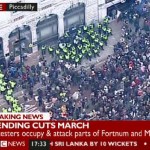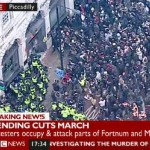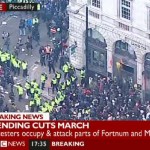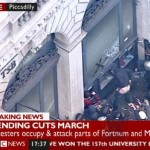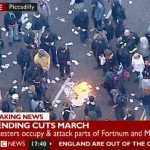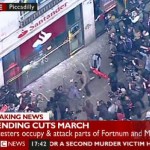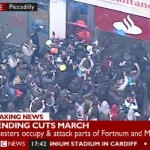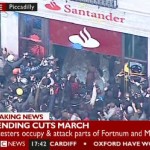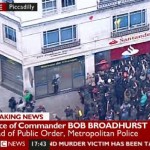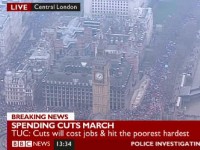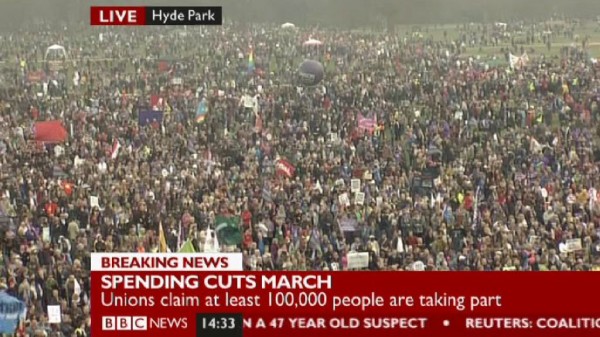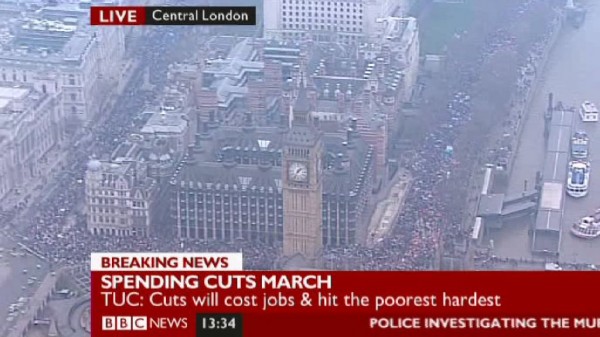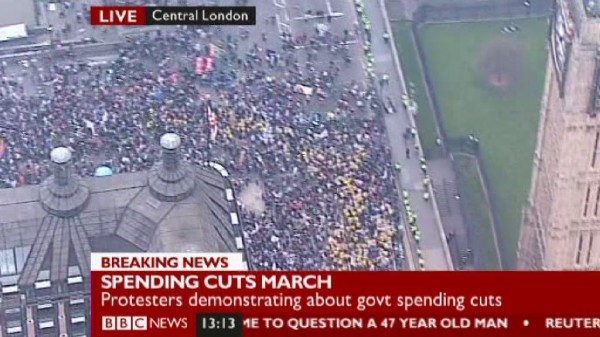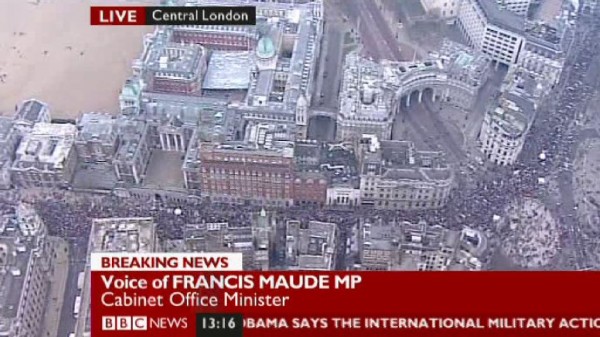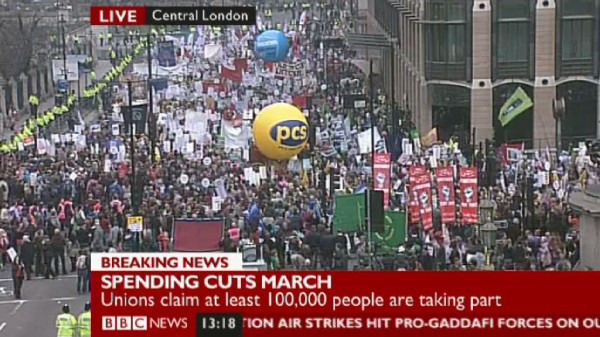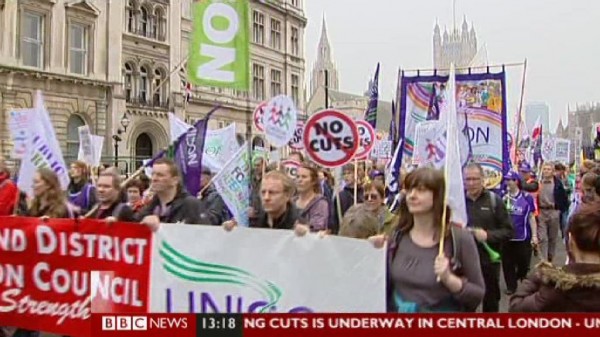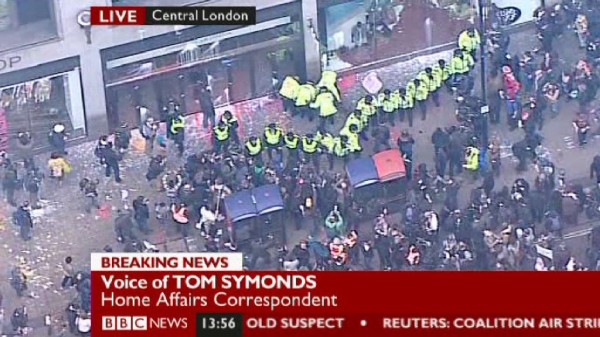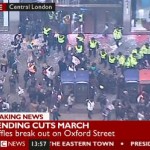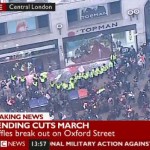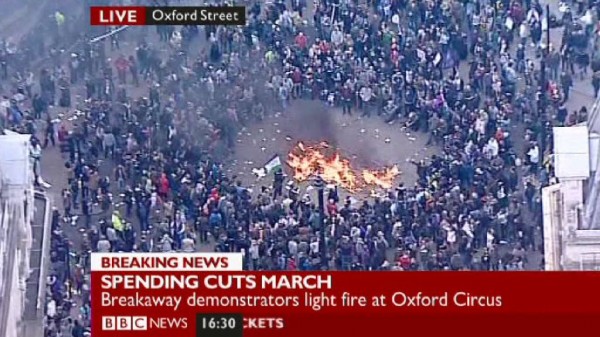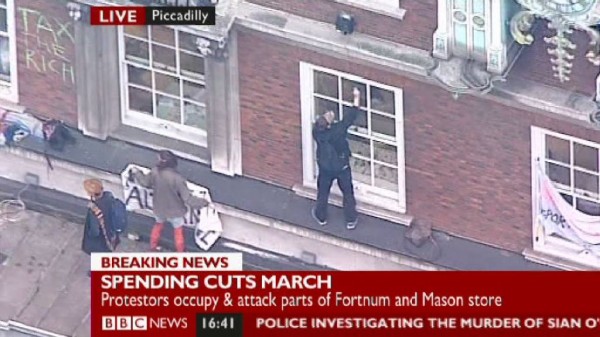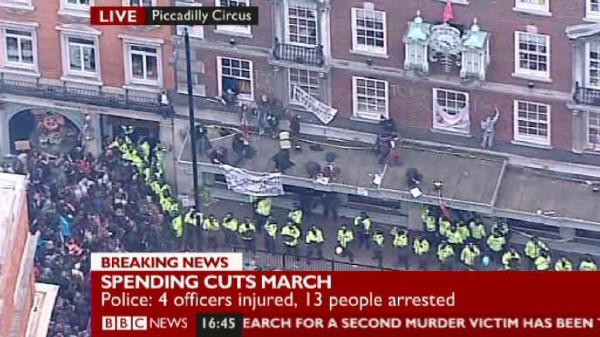Please note: The news media and others use the word violence to mean both attacks on people, and attacks on property. I believe this is misleading, and attacks on property should be referred to as vandalism, however when I am talking about what other people have said, I will use the word violence if that is what they used.
On the 26th of March the TUC held the March For The Alternative in protest against government cuts to services. UK Uncut were also active that day, first joining the march, and later as the TUC marchers listened to speeches in Hyde Park they occupied shops in other parts of London. While all this was going on a group of people dressed in black and with covered faces, a tactic known as Black Bloc, broke windows and threw paint bombs at shops and banks, and sprayed anarchy symbols wherever they could. The news coverage has been all about this vandalism and later fights with the police. For more information from people who were there, please read these accounts.
- What really happened in Trafalgar Square by Laurie Penny at New Statesman
- My experience of 26th March by Soph Warnes at Half the world is watching
- Peaceful occupation and arrest which is a guest post by Anna (@magiczebras) on this blog.
- My day in the cells by Adam Ramsey at Bright Green
It is important to understand that there were distinct groups at these protests. The TUC and all the associated unions, UK Uncut, and anarcho-syndicalists. There were also various other groups and events such as Turn Trafalgar Square into Tahrir Square and Stay for One Day. (In Hyde Park.) Members of UK Uncut are rightly annoyed that the news media and government ministers have repeatedly confused the groups and referred to UK Uncut as violent, blaming the vandalism on them. UK Uncut held an entirely peaceful protest inside Fortnum & Mason, (who are accused of avoiding tax) not damaging anything and even tidying up after themselves. A police officer was recorded on video stating that UK Uncut protesters were “non-violent, sensible.” (02:15 in the video below.)
Diverting slightly for a moment, let me say that the charge of Aggravated Trespass for the Fortnum & Mason occupiers seems very odd. Fortnum & Mason is a privately owned shop, open for business. This gives the public an implied license to enter private property, so on entering, UK Uncut were not trespassing. In this situation a person can only be considered to be trespassing if they are asked to leave. They were not asked to leave, and in fact as the video above shows they were actually prevented from leaving by the police for a while. The charge of aggravated trespass also requires that a person enters the land with the intention of disrupting the normal activity there. In this case, customers were able to continue browsing the shop and even drinking tea. The arrest of 138 peaceful protesters while ignoring most of the people smashing windows is baffling, the lying to them before hand, and their treatment afterwards even more so.
After the march many people including the TUC condemned the vandalism and violence, and seemingly, all groups that protested separately from the main march. Arguments broke out between different groups that otherwise would be united in opposition to the cuts. People were accused of hijacking the march. Richard Murphy at Tax Research UK said on his blog UK Uncut are right in protesting - but it would have been better not to do so on Saturday, which seems to be the opinion of many union members. Some members of UK Uncut distanced themselves from black bloc protesters, while others did not. On the 28th of March Lucy Annson, a UK Uncut protester, appeared on Newsnight and refused to condemn the violence at the march. This video is the Newsnight interview.
Following the march MP John McDonnell started Early day motion 1146 stating “That this House congratulates UK Uncut for the role it has played in drawing attention by peaceful demonstrations to tax evasion and avoidance and to the need for firm action to secure tax justice.” It was signed by 27 MPs. During Prime Ministers Questions on the 30th of March David Cameron was asked to comment on UK Uncut. Here is what he said.
The Prime Minister: I thank my hon. Friend for her question. First of all, we should be absolutely clear that the scenes in central London of property, shops, banks and livelihoods being destroyed were completely and utterly unacceptable. The police should have our full support for the way they policed the march and the action they took. I think that it is important for people to understand that UK Uncut refused to condemn this violence and Opposition Members should remove their names from the early-day motion.
After this statement five MPs withdrew their support for the motion.
A growing number of people are expressing the idea that the anti-cuts movement should have solidarity across all forms of protest. The idea being that you don’t have to support a groups tactics, but if you support their aims then you should not condemn the group either. Early on in this argument the Brighton Solidarity Federation wrote A letter to UK Uncutters from the ‘violent minority’ In it they stated “We think the whole idea of dividing ‘good’ and ‘bad’ protest serves only to legitimise police violence and repression. As we saw on Saturday, repression is not provoked by violent actions, but by effective actions – there is a long history of peaceful pickets and occupations being violently broken up by police, from the Chartists to the Miners Strike.” Vince Cable stated that he would not change policy as a result of protest. He said “No government - coalition, Labour or other - would change its fundamental economic policy simply in response to a demonstration of that kind.” Given this statement many will argue that more drastic tactics are necessary anyway.
This Comment by Kate Belgrave on an article at Liberal Conspiracy gives some insight into this solidarity.
Some of us are aligned to no particular groups and are simply pleased to see protest against cuts breaking out in all shapes and forms. Want to kick in a window? Fine. Join Black Bloc. Want to sit-in and close a bank down? Good – sign up with UKUncut. Want to march with a big group of union members? Excellent. Head out with the TUC. It’s all part of the same thing – an angry reaction to Conservatism. Nobody owns any of it. Nobody has the right to say how protest should look, or what does and doesn’t work, or to try and define the tone. Some of us see the thing as a whole, not as a bunch of competing bits.
Tim Hardy wrote a very interesting article at Beyond Clicktivism: Solidarity Forever. In it he wrote about the Saint Paul Principles. In his words: “These are a set of principles of unity for resisting the 2008 Republican National Convention (RNC) agreed in February 2008 by those planning to confront the RNC.” These principle are set out below. I agree that these represent an excellent model that all anti-cuts groups would do well to follow.
The principles are:
1. Our solidarity will be based on respect for a diversity of tactics and the plans of other groups.
2. The actions and tactics used will be organized to maintain a separation of time or space.
3. Any debates or criticisms will stay internal to the movement, avoiding any public or media denunciations of fellow activists and events.
4. We oppose any state repression of dissent, including surveillance, infiltration, disruption and violence. We agree not to assist law enforcement actions against activists and others.

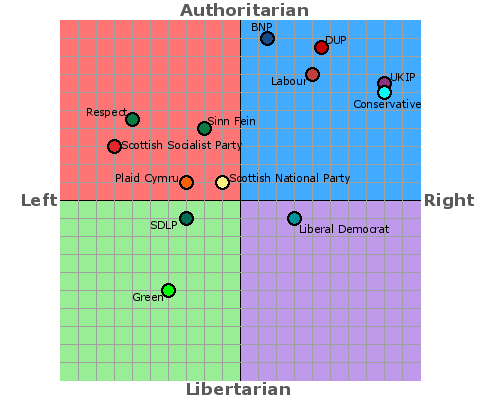
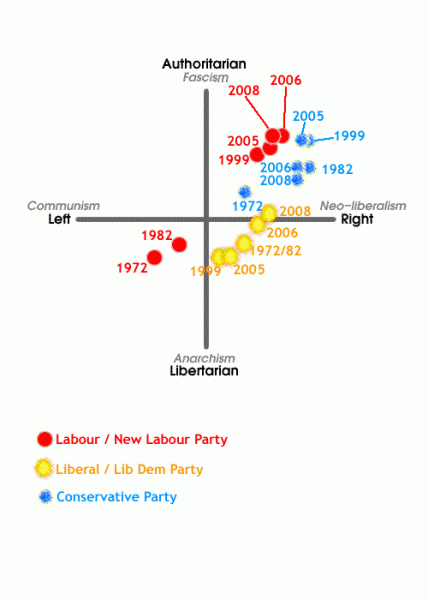
 This guest post is an account of UK Uncut’s actions on March the 26th by @magiczebras
This guest post is an account of UK Uncut’s actions on March the 26th by @magiczebras